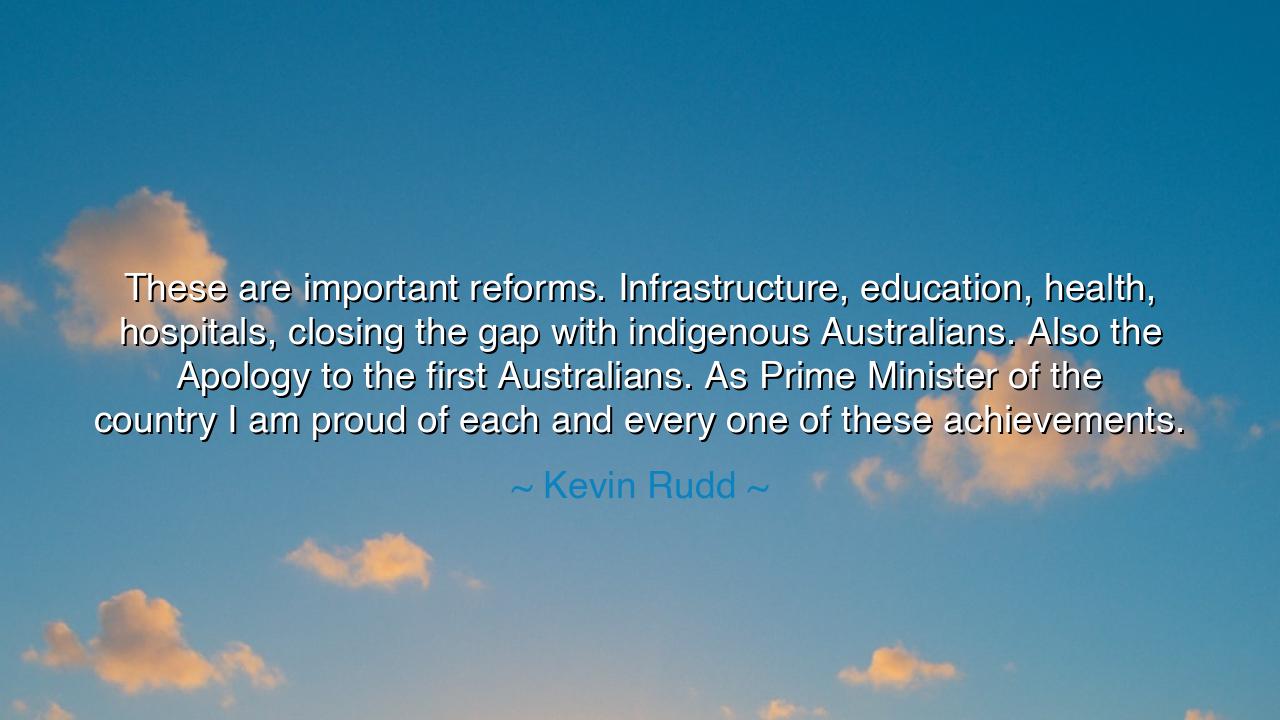
These are important reforms. Infrastructure, education, health
These are important reforms. Infrastructure, education, health, hospitals, closing the gap with indigenous Australians. Also the Apology to the first Australians. As Prime Minister of the country I am proud of each and every one of these achievements.






Kevin Rudd’s words resound like a trumpet across the ages, a declaration not only of political duty but of moral courage. In his reflection, he names infrastructure, education, health, hospitals, and above all the Apology to the First Australians, as pillars of his leadership. These are not idle boasts, but confessions of a leader who sought to bind the wounds of his people. For in every nation’s history there are moments when the earth itself seems to demand justice, when the voices of the past cry out to the present, saying: “Do not forget us. Do not silence us. Do not fail us again.”
The Apology to the First Australians, delivered in 2008, was no ordinary speech. It was the breaking of silence, the tearing down of walls built from centuries of denial. For generations, Indigenous Australians bore the scars of displacement, dispossession, and the cruel policies that tore families apart. Children were taken from mothers, culture was trampled under the march of colonial power, and yet through it all, the First Peoples endured. In rising before Parliament, Rudd did what had been postponed too long: he acknowledged the sorrow, and with words both humble and strong, gave voice to a nation’s regret. Such an act was more than politics—it was an act of healing.
Think of the power of an apology. Once, in ancient Athens, Pericles sought to unite a wounded people not with conquest, but with words that recognized their shared losses in war. He spoke of the city’s dead not as forgotten dust, but as living heroes whose sacrifice bound Athens to a higher purpose. Likewise, in Rudd’s apology, the First Australians were not treated as shadows on the edges of history, but as central figures in the nation’s soul. This turning toward truth, this admission of pain, is the first step toward reconciliation, the bridge between past injustice and future hope.
Yet Rudd did not speak only of apology. He spoke also of the reforms that breathe life into a people: infrastructure that connects distant lands and unites the scattered; education that lights the minds of the young with the fire of knowledge; health and hospitals that shield the vulnerable from the shadow of disease. These are not small matters. They are the very sinews of civilization, the foundations upon which the strength of a people rests. Without them, nations crumble into dust. With them, a society thrives and grows noble.
What lesson, then, shall we draw from these words? It is this: the greatness of a leader is not measured by monuments of stone or by the swelling of wealth alone, but by the courage to heal divisions and to care for the least among his people. To close the gap with Indigenous Australians was not only to uplift one community, but to purify the heart of the nation itself. For no people can rise high while some are left behind in the shadows. Justice withheld from one is justice poisoned for all.
In our own lives, we too are called to this sacred work. When wrongs are done, let us not hide behind silence, but speak the words “I am sorry” with honesty and strength. When we see divisions, whether in family, in workplace, or in society, let us build bridges, not walls. When we are given the chance to raise others—through teaching, through healing, through building—we must seize it, for in serving others, we serve the destiny of humanity itself.
So let the example of Rudd’s achievements echo in our hearts. Let us remember that true reform is not the glitter of new structures alone, but the mending of old wounds. True leadership is not domination, but service. And true pride is not selfish glory, but the quiet strength of having uplifted the broken, healed the sick, and honored the forgotten.
Thus, children of the future, hear these words: do not fear the humility of apology, nor the labor of reform. These are the deeds that outlast empires. These are the songs that generations yet unborn will sing. Walk boldly, heal courageously, and let your life be a bridge where once there was a chasm. For in such living, you honor not only yourselves, but all who came before you.






AAdministratorAdministrator
Welcome, honored guests. Please leave a comment, we will respond soon